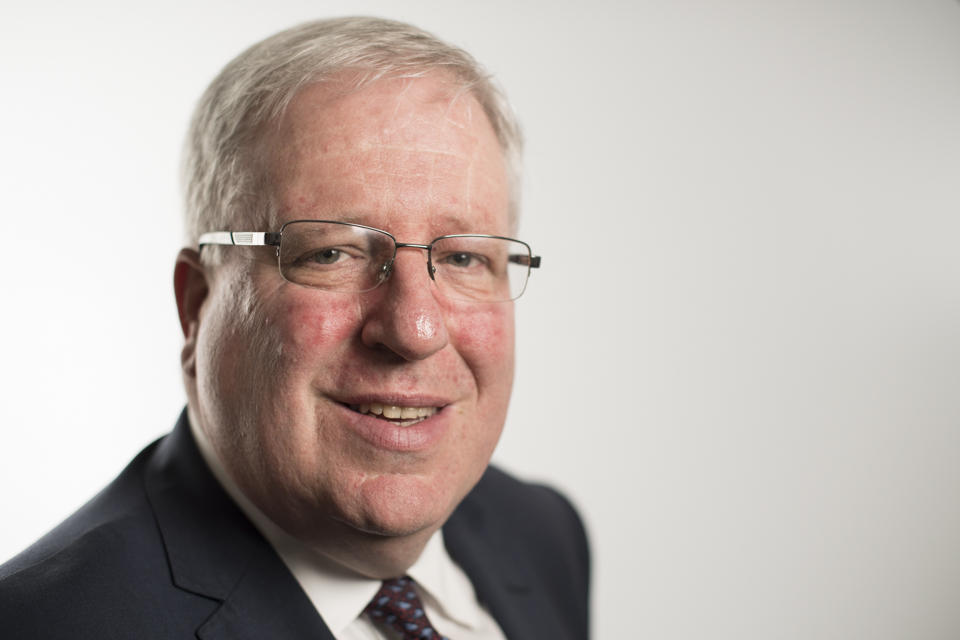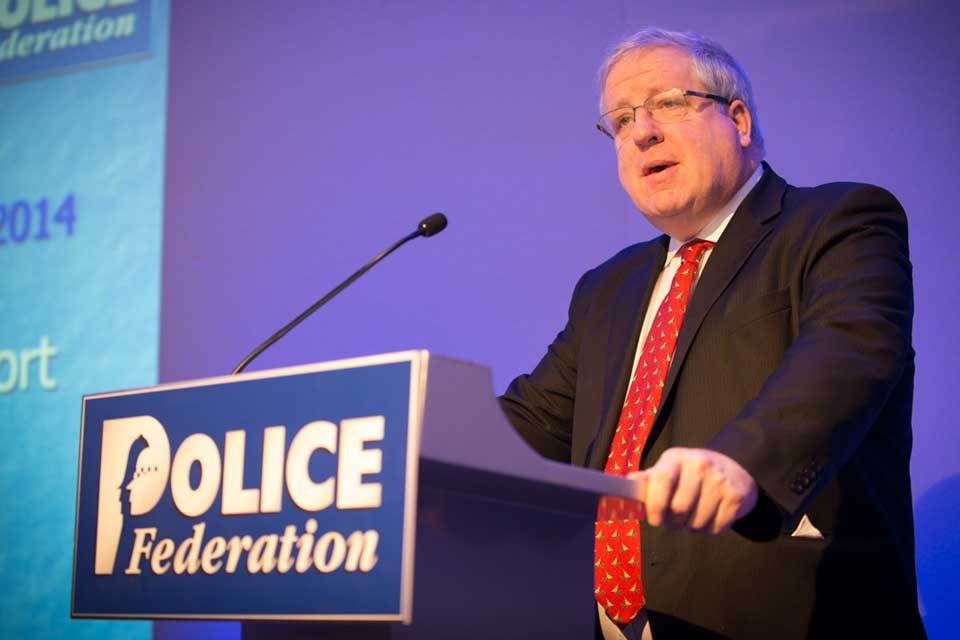National Roads Policing Conference 2014
Patrick McLoughlin announces help for the Police to tackle Drug Driving and other steps to improve road safety.


Patrick McLoughlin MP at the National Roads Policing Conference 2014
Thanks for that introduction - and good afternoon everyone.
It’s an absolute pleasure to join you for your annual conference, and I’m grateful to the Police Federation and ACPO for inviting me to speak.
Today (16 January 2014) I want to talk about the changing nature of roads policing, and what we are doing in government to support better enforcement.
But before I begin, I want to say something that perhaps isn’t said enough.
And that’s a massive ‘thank-you’ for the vital job you do.
We are fortunate in this country to have one of the best road safety records in the world.
That’s due to the efforts of many different people working for many different organisations – from car designers and fleet managers to local authority planners and road safety charities.
But of all the professionals working to improve safety on our roads, no-one does a more important - or tougher - job than you.
Patrolling the network day in, day out.
Providing reassurance to millions of motorists.
Saving lives by keeping dangerous drivers at bay.
Tackling vehicle crime.
Helping to prevent traffic snarl-ups.
Working at crash scenes.
And perhaps most difficult of all, liaising with the families of victims.
Thanks to your dedication and hard work, road casualties in the UK continue to fall.
The latest figures show reported deaths down 3%, and injuries down 7% in the year to June 30th, 2013.
You do an outstanding job. And I can assure you that’s recognised at the highest levels of government.
The challenge for all of us in the road safety industry is how to continue improving – how to set higher standards, year after year.
Despite the progress we have made together reducing casualties in recent years, we must guard against any sort of complacency, because every road death is one too many - a life cut short, and a family devastated.
Instead we must commit to redoubling our efforts to crack down on the causes of road collisions, in particular, dangerous drivers.
And taking full advantage of new technologies is one of the best ways we can clamp down on the irresponsible minority.
We’ve succeeded over almost half a century in making drink-driving socially unacceptable.
In fact drink drive deaths have fallen by more than three quarters since 1979.
But still, 1 in 7 road deaths involves a driver over the alcohol limit.
So it’s imperative that we keep on targeting these drivers, and bring the full weight of the law to bear against them.
As you heard in Damian Green’s speech earlier, we are working to get type approval for new mobile breath-testing equipment. Crucially, this will allow officers to take evidential samples at the roadside.
No need to take suspects back to the station. No danger that a positive sample will turn to negative because of the delay. And no problem using the evidence in court.
In parallel, we are also getting rid of the statutory option, which allows drivers to play for time by asking for a doctor’s sample.
These are important changes which you have asked for.
They will not only improve enforcement, but make your job easier too.
Police have been working with alcohol breathalysers - backed by a legal drink-drive limit - since 1967.
By comparison, the fight against drug-driving is only just beginning.
But I’m confident that over the next few years, we will make significant progress catching and prosecuting those who drive under the influence of drugs.
Drug driving is estimated to cause 200 deaths a year on our roads. Yet perpetrators are 50 times less likely to be convicted than drink drivers.
The difficulty for roads police is proving that impaired driving is due to a drug.
A huge amount of time and effort is wasted because of failed prosecutions.
What’s needed is effective technology to screen suspected drug drivers, and effective legislation to convict them. That’s why we introduced a new offence of driving over a particular limit for specified controlled drugs, which brings the law into line with drink driving.
After consulting on limits for 16 different types of drug last summer, we are currently consulting on a limit for amphetamines.
Our responses to both consultations will be published together, and we expect to finalise the regulations and introduce the offence as early as this summer, subject to Parliamentary approval.
Today (16 January 2014) I can also announce funding for station-based cannabis screening devices, which a number of police forces will soon begin using to familiarise themselves with screening technology.
It’s not a big programme at this stage. The investment is around £120,000. But it’s certainly a significant step in the right direction.
The new devices mean there will be no need to wait for a medical practitioner to advise whether a driver’s condition is the result of taking a drug. That will save time and money.
We are also working to get mobile screening devices available shortly after the new offence comes into force, so officers can use them at the roadside.
We know that drug driving enforcement is complex compared with alcohol. But this is just the start.
By working closely with roads police, we’ll be able to refine the technology and the enforcement strategy over time.
Screening for cannabis is a good place to begin. It’s one of the most widely used drugs, and it can also significantly impair a motorist’s ability to drive safely.
That’s why we hope police will embrace the new screeners and the new powers as a first step in stamping out drug driving.
We are supporting these measures with marketing campaigns - and with higher penalties for offenders.
It’s important that people understand the risks of driving while under the influence of alcohol or drugs. That not only means risks to other road users. But the personal risk too. This is something we’ve highlighted in our THINK! adverts in recent years. How one extra drink could lead to a driving conviction, which could threaten people’s jobs, for example.
We’ve also taken action to crack down on careless driving by making it a fixed penalty offence and increasing fines from £60 to £100.
I’d be interested to hear from you later how enforcement of the new offence is going.
It always takes time to implement and get used to new measures like these. But I welcome feedback on all aspects of roads policing. How successful you’ve been in tackling mobile phone use on the road, for example. Only through regular dialogue can we in government shape our policies and legislation to fully support you in your work.
Another shared challenge is how we can speed up the reopening of roads after major incidents on the network.
We have made good progress since the launch of the CLEAR initiative 2 years ago. Which brought together the Highways Agency, DfT, VOSA, police, fire and ambulance services to reduce the duration of motorway closures.
A key achievement has been the availability of 3D laser scanners which allow police to capture evidence quickly after collisions, and the launch of a smart phone app to notify people of incidents and congestion.
CLEAR has already saved our economy millions of pounds. But challenges remain - as I saw when I spent an interesting day with West Midlands police and the Highways Agency last September on the M6.
Co-operation between the Highways Agency, police, VOSA and emergency services has been encouraging. But we’re looking at how to co-ordinate activities even more effectively to reduce long motorway closures - for example through better leadership, greater resource sharing between police forces and by reducing boundaries between the different CLEAR participitants.
Co-operation between police and government has also helped substantially reduce uninsured driving.
There were an estimated 2 million uninsured vehicles on the road in 2005. By the end of 2012, that had dropped to 1.2 million, thanks to new police powers to seize vehicles, improvements to the uninsured database and continuous insurance enforcement.
Between June 2011, when continuous enforcement began and the end of last year, the DVLA issued 450,000 fixed penalty notices to registered keepers, and collected £8.4 million in penalties and court costs.
That’s a fantastic result that we will build upon in the future.
So to sum up. Together, we’ve made big strides over the past few years. Better policymaking. More effective targeting of persistent road offenders and dangerous drivers. And continued reductions in vehicle crime.
Britain’s road safety record has gone from strength to strength. And we’ve cut the disruption caused by crashes on the road and motorway network.
But how well we progress in future in all these areas will depend to a large degree on how well we develop and adapt to new technologies. Like roadside drug and drink testing devices. Station based screening equipment. Smart tools to check databases and criminal records. And evolving technologies to manage traffic.
There’s no doubt that new technologies like these have the potential to radically influence the way we police our roads, and save hundreds more lives on our roads each year.
That is our shared challenge. I will do all I can to assist you in your jobs in making our roads safer. And I’m convinced that by working closely together, it can also be our shared achievement.
Thank you.